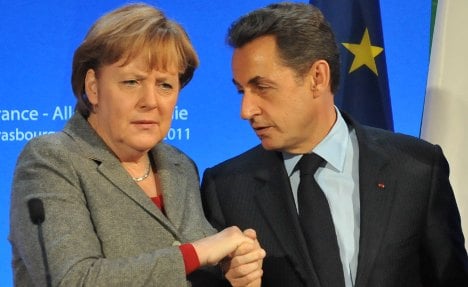Until now, Berlin had assumed its number two at the finance ministry, Jörg Asmussen, would automatically take over from fellow German Jürgen Stark as the ECB’s chief economist when he steps down at the end of the year.
But sources familiar with matter told AFP that Paris has also now thrown its hat into the ring in the person of Benoit Coeure — chief economist of the French economy and finance ministry and number two at the French treasury.
The source was confirming a corresponding report in German business daily Handelsblatt on Tuesday.
“Berlin and Paris are both laying equal claim to the post. It’s a dead heat,” the newspaper quoted French government and central bank sources as saying.
“Benoit Coeure clearly has the competence and the profile for the position of chief economist,” one source told AFP, speaking on condition of anonymity.
“He and Asmussen could swap portfolios and Asmussen could be responsible for the bank’s international affairs. But, ultimately, it’s up to the executive board to decide,” the source said.
In a shock announcement in September, 63-year-old Stark, who has been the ECB’s chief economist since 2006, said he would step down before his term of office ends in May 2014.
Stark cited “personal reasons” for his decision but it is widely believed he is quitting in protest over the ECB’s controversial programme of buying bonds of those countries – such as Greece – which find themselves unable to drum up financing on the markets.
The six-member executive board is the body responsible for the day-to-day running of the ECB and implementing the decisions taken by the bank’s policy setting governing council at its twice-monthly meetings.
Ever since the ECB was set up, the position of chief economist has been held by a German: first Otmar Issing and then Jürgen Stark.
However, the rule is not set in stone and, according to the ECB’s statutes, appointments are not made according to nationality, but expertise and competence.
Nevertheless, with the retirement of Frenchman Jean-Claude Trichet as president, France, the eurozone’s number two economy, has no representative on the six-member executive board, while Italy has two – Trichet’s successor Mario Draghi and Lorenzo Bini-Smaghi.
As a result, Paris exerted heavy pressure on Bini-Smaghi to hand over his seat to a Frenchman and the Italian finally succumbed and announced his early resignation earlier this month.
The French government had already lined up the 42-year-old Coeure to take his place, a nomination that now has to be approved by European leaders.
The distribution of the different portfolios on the executive board is not tied to a specific seat and Asmussen is not guaranteed to assume the position of chief economist automatically.
Nevertheless, Berlin is keen to retain that particular post in order to cement the ECB’s strong anti-inflation credentials it inherited from the powerful German central bank, the Bundesbank.
The tug-of-war for the position highlights the increasingly diverging views of Paris and Berlin over the ECB’s role in fighting the sovereign debt crisis that is threatening to push the world into recession.
France wants the ECB to become a lender of last resort, with the firepower to protect debt-ridden eurozone members from falling victim to the bond markets.
But Germany is vehemently opposed, scarred by its experiences between the two world wars when its central bank printed unlimited amounts of money to stave off an economic slump, resulting in hyperinflation and the eventual rise of Nazism.
This time around, in addition to inflation concerns, Berlin is worried that allowing the ECB to ride to the rescue will reduce the incentive for fiscally recalcitrant states to take their medicine in the shape of deficit cuts.
AFP/mdm



 Please whitelist us to continue reading.
Please whitelist us to continue reading.
Member comments